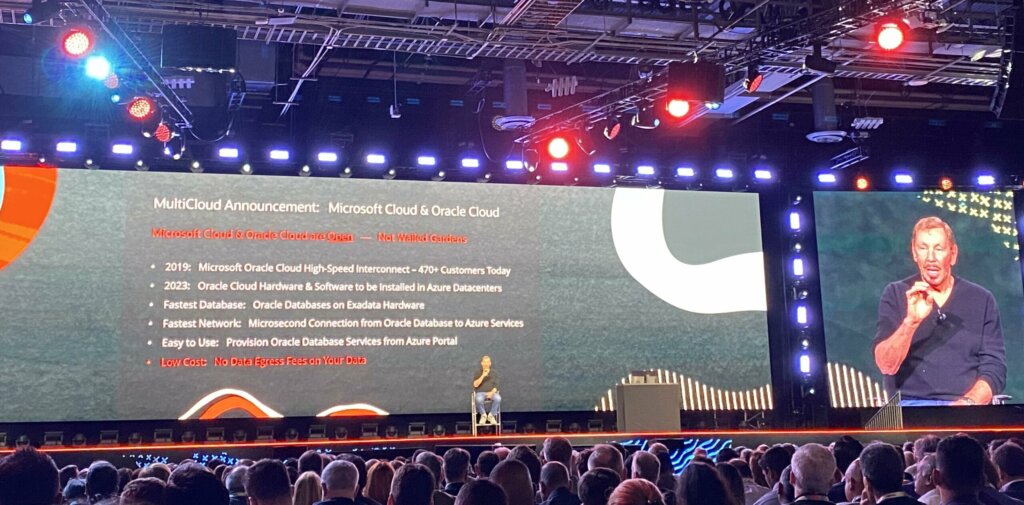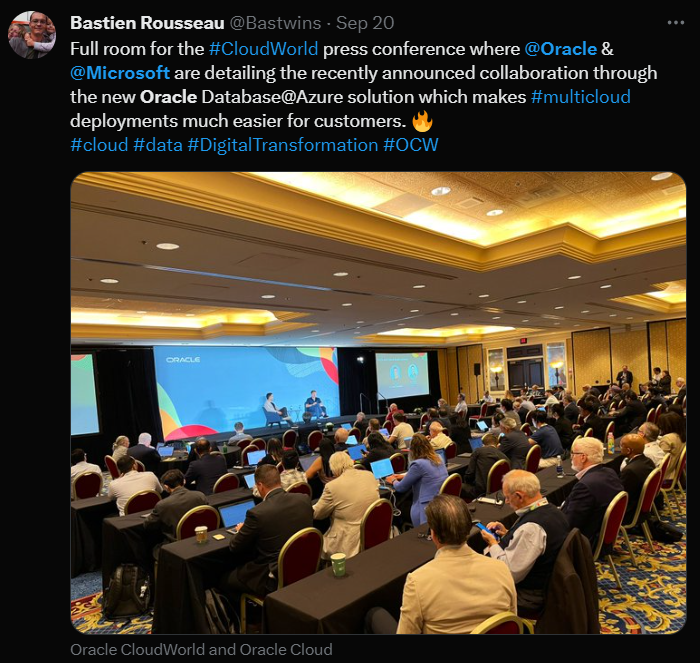
Oracle EVP, Clay Magouyrk and Judson Althoff, Microsoft’s Chief Commercial Officer, expressed the collaboration’s evolution.
Oracle CloudWorld 2023: Everything you need to know about the Oracle and Microsoft partnership
|
Getting your Trinity Audio player ready... |
- Oracle CloudWorld 2023 unveils a partnership with Microsoft focusing on interconnected cloud systems.
- Oracle’s partnership with Microsoft and investment in Ampere underscore its commitment to seamless integration and innovation.
During Oracle CloudWorld 2023, its recently announced partnership with Microsoft drew significant curiosity. Larry Ellison, Oracle’s CTO, provided clarity in his keynote, highlighting his alignment with Microsoft CEO, Satya Nadella. They share a fundamental vision: clouds should be open and interconnected, not isolated.
Today, it is clear that customers engage with multiple cloud platforms and rarely limit themselves to just one. Ellison pointed out, “In the infrastructure realm, four [hyperscalers dominate]: AWS, Microsoft Azure, Google, and us. While numerous application providers exist, they all function within the cloud paradigm. Customers often use services from AWS, Google, Salesforce, ServiceNow, and more. It is our job to ensure these services interconnect seamlessly together. For example, if someone wishes to use Salesforce’s sales automation application and then integrate it with an Oracle data warehouse, it should be simple, given the interconnected nature of both clouds.”
Unveiling Oracle’s vision for interconnectivity at the CloudWorld 2023
Ellison emphasized the importance of smooth integration between platforms like OpenAI’s ChatGPT and Oracle’s autonomous database or between Microsoft Teams and Oracle. Barriers between clouds should be non-existent, and customers should not face penalties for transferring data. After all, the data is theirs.
Ellison and Nadella believe that interconnected cloud systems are the future, influenced by customers’ evolving needs and their use of multiple cloud services.

Oracle and Microsoft believe that clouds should be open and interconnected, not isolated.
Oracle began experimenting with interconnected cloud systems in 2019. Crafting high-speed interconnections was challenging. As a solution, Oracle embedded its cloud services in Azure data centers, allowing users to access Oracle and Microsoft services via the Azure portal without latency.
In a discussion with Oracle EVP, Clay Magouyrk, Judson Althoff, Microsoft’s Chief Commercial Officer, expressed the collaboration’s evolution. Their recent efforts differ significantly from the earlier Oracle Interconnect for Azure initiative.
Althoff emphasized that the initial Interconnect was a pioneering collaboration to enhance user experiences. Through it, Microsoft gained vital insights. The main expectation from both Microsoft and Oracle users was the delivery of high-performance, real-time services, making it crucial to address Interconnect’s latency.
To this end, embedding OCI within Azure was identified as the optimal strategy, providing users with a boundary-free experience. “Users can access the Azure portal, and if they have an existing Azure Cloud consumption commitment, they can effortlessly utilize Oracle services. These services are strategically placed within the same data center, adjacent to each other, ensuring zero latency and delivering the best of both ecosystems,” Althoff explained.
The partnership will start in 12 regions, with plans for future expansion. Certain hero regions stand out, packed with computing and AI resources. With the rising deployment of generative AI solutions, such as Microsoft Copilots integrated with the Oracle database, users can expect even better experiences.
Karan Batta, Vice President of Product at Oracle, touched upon this partnership, noting that many customers have committed to Azure while having a significant Oracle presence on-premises. The question for them is how to integrate these two environments seamlessly.
Oracle CloudWorld 2023: Oracle and Azure working in harmony
This collaboration allows customers to use their funds to access Oracle data services. “We will indeed be replacing the OCI infrastructure within Azure data centers,” Batta said. “Another advantage for customers is the ability to leverage the benefits they receive from Oracle programs. If you have Unlimited License Agreements (ULA) or options like ‘Bring Your Own License’ (BYOL), those can be used.
Additionally, if you have a support agreement with Oracle, we offer a program that allows a reduction in your support bill when using our cloud products. This benefit will be available to customers accessing data services through Azure as well.”
Batta highlighted the crucial flexibility this offers. While the services are technologically and functionally identical, commercial agreements require collaboration with Microsoft and Oracle.
The question then arises: Should companies not yet on the cloud choose Oracle or Microsoft Azure?
Batta believes customers will lean towards multiple cloud providers, with their initial choice influenced by their existing investments.
For instance, if they are deeply invested in Microsoft, they might start with Azure. Yet, even in that scenario, they can still utilize services such as the Exadata Database Service and the Oracle Autonomous Database through Azure. However, they will still need to collaborate with Oracle for that. Conversely, a company deeply rooted in Oracle may initiate their journey with OCI. A lot hinges on the specific workflow. If a company is primarily a database-centric organization, that will guide its initial steps.
“I firmly believe that the era of multi-cloud isn’t a matter of choice, [but inevitability.] It’s not about “if” but “when.” Most customers will seek to harness multiple cloud providers, aiming for the best of each one’s offerings,” said Batta.
Oracle’s multi-cloud era: Inevitable and emerging
Corey Sanders, the Corporate Vice President of Microsoft Cloud for Industry, agreed with that notion. He highlighted the growing trend towards a multi-cloud strategy and expressed hopes for broader partnerships among cloud providers.
“The appropriate choice heavily depends on the specific challenges a company seeks to overcome. This is why providing people with choices often proves to be the best answer when making decisions. Companies can then determine the optimal path based on their immediate needs,” he added.
One of the primary reasons for choosing Azure was its commendable OpenAI positioning. This allows for the advanced leveraging of data retrieval and generation, showcasing the innovative work Microsoft has consistently delivered.
As Oracle shifts towards a more AI-centric approach, there is speculation regarding its path. Oracle may opt to utilize services from Microsoft or introduce its own offerings. This speculation is heightened as Oracle has yet to announce its support for enhancing generative AI across large language models.

Oracle and Microsoft talk about the new Oracle Database@Azure solution and more at Oracle CloudWorld 2023. (Source – X)
From an AI perspective, Oracle has already discussed its offerings with Cohere. This will be its primary position from an OCI viewpoint. Essentially, Oracle has a three-pronged strategy:
- At the core, Oracle offers infrastructure, including superclusters, that benefits many startups looking to build base models on top of them.
- Moving on from that, the strategy targets enterprises — including its OCI customers — that want to develop generative AI capabilities based on their data for their consumption.
- Lastly, Oracle aims to integrate this intelligence into their applications.
“So, from that perspective, we have our unique strategy. I think it provides great opportunities for Azure customers if they want to build using other services on Azure or leverage other data stored in the database, for instance. Ultimately, it depends on where the customers are and their specific use cases,” Batta emphasized.
Sanders also highlighted that Microsoft is enthusiastic about GPT-4 and the overall GPT stack, appreciating its capabilities. Microsoft maintains openness to a broad array of models, believing in choosing the right model for the right job. Ensuring this level of choice is a fundamental part of its overall strategy.
Oracle’s commitment to Ampere Computing
In a related development underscoring Oracle’s commitment to advancing its cloud capabilities, the company has made a substantial investment in Ampere Computing, a startup known for its innovative processor chips. According to Oracle’s proxy statement, the company prepaid US$104.1 million for processor chips manufactured by Ampere. Furthermore, Oracle has invested an additional US$400 million in Ampere through a convertible note in fiscal 2023.
Ampere’s specialization lies in crafting custom server chips based on Arm technology, positioning them as competitors to the designs produced by Intel and Advanced Micro Devices, which utilize X86. Oracle’s substantial financial commitments to Ampere, amounting to hundreds of millions of dollars since its inception, are documented in the filings.

Oracle’s showing commitment to Ampere Computing at Oracle CloudWorld 2023.
This strategic investment in Ampere and its chip purchases are part of Oracle’s dedicated effort to elevate its cloud services, offering them a distinct advantage over rivals. This move parallels the efforts of Amazon.com and Google, with Amazon producing its server chips and Google developing its artificial intelligence processors. The collaboration with Ampere reflects Oracle’s proactive approach to harnessing cutting-edge technologies to bolster its cloud services, further augmenting its partnership with Microsoft and underscoring its commitment to delivering optimal solutions to its customers.
This continual investment and collaboration reaffirm Oracle’s steadfast dedication to evolving alongside technological advancements and customer demands, ensuring its position at the forefront of the cloud and AI industry.
READ MORE
- Safer Automation: How Sophic and Firmus Succeeded in Malaysia with MDEC’s Support
- Privilege granted, not gained: Intelligent authorization for enhanced infrastructure productivity
- Low-Code produces the Proof-of-Possibilities
- New Wearables Enable Staff to Work Faster and Safer
- Experts weigh in on Oracle’s departure from adland


